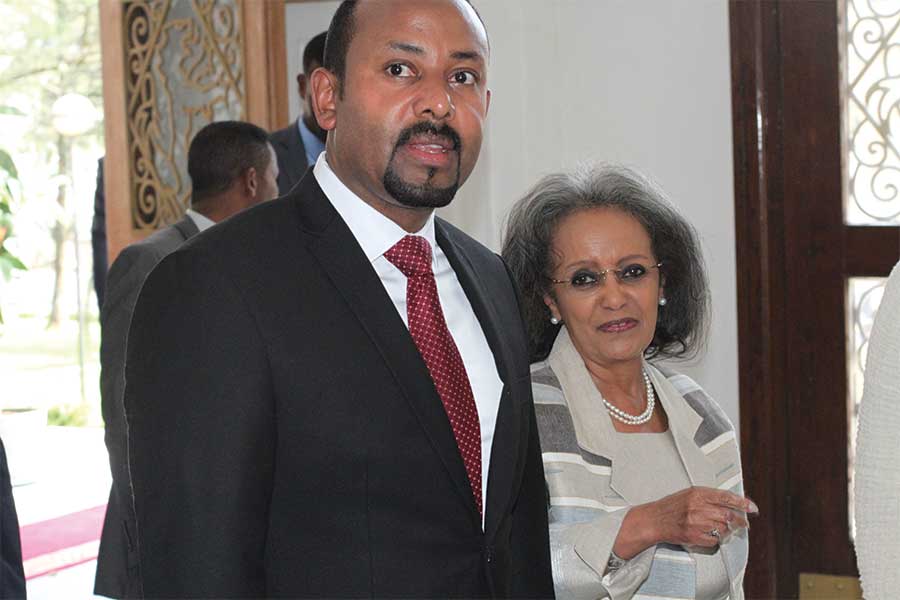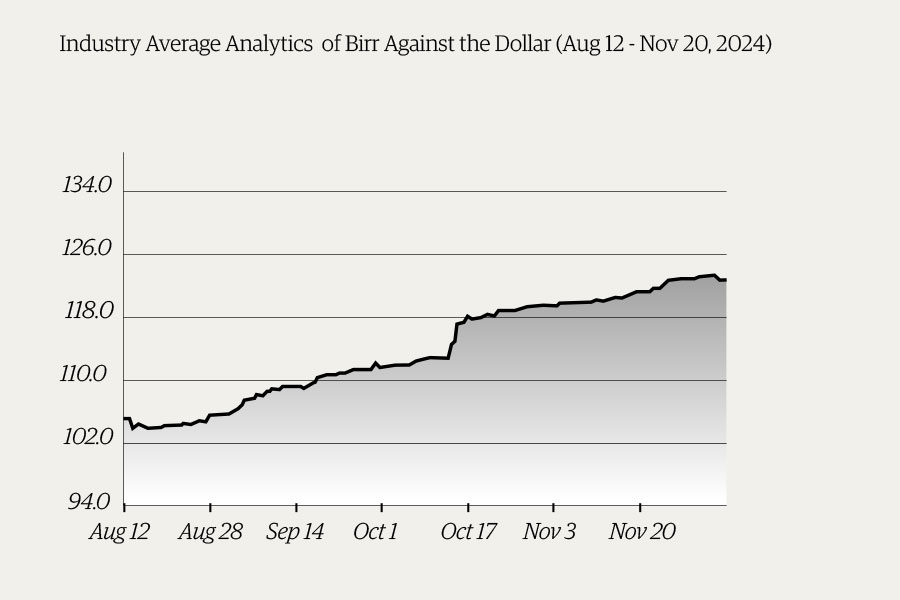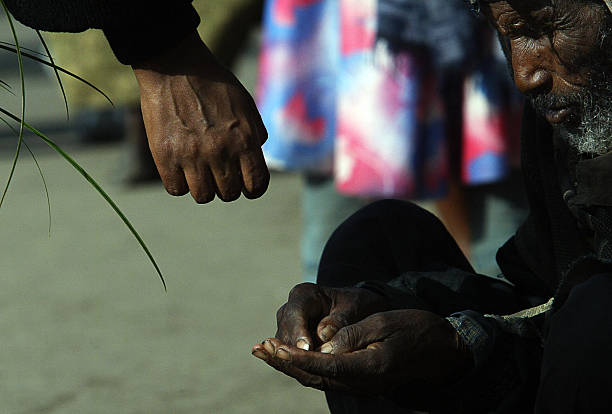
Fortune News | Oct 12,2019
Limestone dealers will be exempted from a 15pc value-added tax (VAT) in the federal authorities' bid to control worsening soil acidity on agricultural land.
Officials at the Ministry of Agriculture (MoA) and regional agriculture bureaus have been pursuing the application of lime as a cure for soil acidification. These official estimate that close to 6.7 million hectares of the total 22.8 million hectares of farmland is affected by soil acidity. Over half the afflicted area is designated as highly acidic.
Experts at the Ministry are pushing for the exemptions of limestone transactions from VAT. Last week, senior officials from the MoA, the central bank, the Ministry of Revenues and the Commercial Bank of Ethiopia (CBE) had endorsed the proposal. It will be sent to the Ministry of Finance for approval next week, disclosed Tefera Solomon, director of soil fertility at the MoA.
“The move is necessary," Tefera told Fortune. "Soil acidification is becoming a critical issue that requires urgent attention, especially in highlands and densely populated areas.”
Soil acidity comes from the build-up of hydrogen and aluminium ions in the soil, which pushes out essential nutrients and hampers plant growth. Agricultural limestone, or lime, is an alkaline substance that can reverse the process. On average, five quintals of lime is required to treat a hectare of acidic soil. The annual demand for limestone is estimated at 40 million quintals. Despite the estimated 900 million tonnes of limestone deposits in the country, supply is limited, with only 12 limestone producers operating with an annual production capacity of 720,000qtl.
Qela Lime Factory is one of these producers in Sidama Regional State. Incorporated in 2010, the company has been unable to utilise more than a third of its 60,000qtl in annual capacity over the past three years.
“The lime crushing plant breaks down frequently,” said Mamo Legesse, manager of the company. “Foreign currency is not easily available to import parts on short notice.”
Over the first six months of the fiscal year, the company produced 11,000qtl of lime, meeting less than a quarter of its target. Regional, zonal, and wereda agricultural bureaus are Qela's primary customers, buying the mineral and distributing it to farmers. A quintal of lime goes for 120 Br.
Mamo is doubtful that lifting VAT will make a difference in the use of lime by farmers.
“We can’t sell what we have in stock for months," he said. "Farmers are not interested in using the lime supplied to them for free."
Nonetheless, acid-related soil fertility problems remain significant constraints farmers face in the Amhara and Southern regional states.
Alebachew Abegaz, director of crop development of the Amhara Agriculture Bureau, says soil acidification is expanding dramatically in the region. Close to 1.7 million hectares of land is affected, over two-thirds of which is "critically affected."
Haile Letamo, a father of 12, farms wheat, maize and vegetables on an eight-hectare plot in Gorche Wereda of the Sidama Regional State. A quarter of his farmland is affected by high soil acidity, allowing him to harvest no more than 12qtl a hectare. This represents only a third of average agricultural productivity. He received 90qtl of lime from his wereda agricultural bureau over the four months preceding the last Mehir season, at no cost to him.
He saw productivity increase to 30qtl after applying lime on the three hectares.
Both natural and artificial factors contribute to soil acidification. Soil becomes acidic due to leaching under high rainfall conditions, especially in tropical climates.
However, an unscientific application of chemical fertilisers without soil tests is the main factor behind soil acidification in Ethiopia, according to Lemma Wogi (PhD), assistant professor of soil science at Haromaya University. He has published over 10 research papers on soil fertility, fertiliser applications and management of problematic soils.
Farmers in Ethiopia had been using two types of fertilisers – urea and diammonium phosphate (DAP).
“The inappropriate application of these has adversely affected physical properties, such as structure and bulk density of soil,” said Lemma.
The Agriculture Ministry took steps to curtail the inadvisable application of fertilisers by releasing a preliminary recommendation atlas to nine regional states five years ago. In 2018, other types of fertiliser (NPS and mixed fertiliser) were introduced. Ethiopia uses an average of 1.9 million quintals of fertilisers annually.
Officials from the MoA have asked the state-owned CBE to advance up to 870 million Br in credit to farmers willing to use the loans to buy limestone. Last year, the Bank availed 570 million Br in credit for the same purpose. Farmers in the Amhara, Oromia and Southern regional states had benefited from the scheme. Farmers in Benishangul-Gumuz will be included this year, according to Tefera.
"The credit will be disbursed after the management and board of directors approve the request,” Fikerte Gashaw, director of SME credit at the CBE, told Fortune.
Officials have also asked the Bank to lower lending interest rates, though they declined to disclose the amount. Credit must be available to farmers beginning next month if the goal is to be met, according to Alebachew.
Officials of the Amhara Regional State Agriculture Bureau plan to supply 300,000tns of limestone to 600,000 farmers for the next Mehir season.
The expert urges the authorities and agriculture extension workers to keep a close eye on the application of lime by farmers.
“Excessive application of lime can substantially lower the soil's micronutrient content," he said.
Lemma observes that organic fertilisers can be a viable alternative to limestone.
“Although it requires huge volumes of natural fertilisers to treat acidic soil, it is cheaper than the lime," he said.
PUBLISHED ON
Feb 05,2022 [ VOL
22 , NO
1136]

Fortune News | Oct 12,2019

Fortune News | Oct 27,2024

Fortune News | May 01,2022

Fortune News | Aug 13,2022

Commentaries | Jan 01,2022

Radar | Mar 12,2022

Money Market Watch | Dec 08,2024

Fortune News | Sep 07,2025

Fortune News | Oct 26,2025

View From Arada | Nov 27,2018

Dec 22 , 2024 . By TIZITA SHEWAFERAW
Charged with transforming colossal state-owned enterprises into modern and competitiv...

Aug 18 , 2024 . By AKSAH ITALO
Although predictable Yonas Zerihun's job in the ride-hailing service is not immune to...

Jul 28 , 2024 . By TIZITA SHEWAFERAW
Unhabitual, perhaps too many, Samuel Gebreyohannes, 38, used to occasionally enjoy a couple of beers at breakfast. However, he recently swit...

Jul 13 , 2024 . By AKSAH ITALO
Investors who rely on tractors, trucks, and field vehicles for commuting, transporting commodities, and f...

Nov 1 , 2025
The National Bank of Ethiopia (NBE) issued a statement two weeks ago that appeared to...

Oct 25 , 2025
The regulatory machinery is on overdrive. In only two years, no fewer than 35 new pro...

Oct 18 , 2025
The political establishment, notably the ruling party and its top brass, has become p...

Oct 11 , 2025
Ladislas Farago, a roving Associated Press (AP) correspondent, arrived in Ethiopia in...